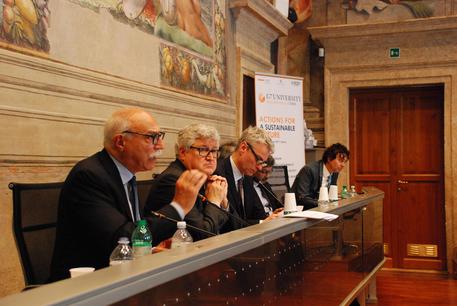(ANSA) - Rome, June 28 - The rector of the University of
Siegen, Holger Burkhart, told ANSA in an interview that nobody
should be excluded from higher education based on the lack of
resources and that Germany's dual education system offers
excellent employment opportunities.
The rector was speaking ahead of the event "G7 University -
University education for all. Actions for a sustainable future",
scheduled to take place in the northern city of Udine on June
29-30.
Over 150 deans, lecturers and students from the G7 countries
are expected to take part in the initiative, which is part of
the Italian festival of knowledge - 'Conoscenza in Festa'.
Q: The motto of the summit of rectors is "university for all"
but the German model shows that academic education is not
indispensable to access the labor market. What do you think
about this slogan?
A: I see it as a call to those with responsibility, in politics,
to ensure that higher education is accessible to all those who
have an interest and the necessary requirements for successful
studies. Nobody should be excluded based on their provenance or
the lack of economic resources. On the other hand, a society and
an economy do not benefit from the fact that the great majority
of a generation opts for a higher education school. Germany's
dual education system actually offers excellent employment
prospects for the young. It is an indisputable fact in all
advanced economies that the phase of education and that of
employment are not consecutive, as in the past, but increasingly
cross. Those offering academic training and employment training
need to improve the passage from academic to job training. And
this means developing and agreeing on new training offers built
for this purpose.
Q: Today we are witnessing with anxiety the growth of
anti-European populism in the EU. The Erasmus program is said to
have produced a generation of young Europeans. Do you think this
is true? Can university build Europe?
A: I believe this statement is true. A study on the impact of
Erasmus in 2014 showed that Erasmus alumni were clearly more
mobile: 40% of Erasmus students had moved to another country one
year after the end of their studies, compared to 23% of those
who had not moved as students; 93% of Erasmus students can
imagine living in another country while only 73% of those who
never left their (country) answered in this way. One-third of
Erasmus students has a partner of another nationality, this
concerns only 13% of the other group. It is therefore truly
possible to talk about an Erasmus generation for whom Europe is
a reality they have experienced. This groups shows that it is
particularly open to the concept of Europe and decidedly goes
against isolationist movements, like Brexit and populist
currents, like in Poland and Hungary.
Q: Italian university is suffering from the lack of adequate
resources for research and the brain drain is a well-known
phenomenon. How is the situation in Germany?
A: The Italian research system and research politics in Italy
in my opinion are faced with the challenge of having to boost
the attractiveness of the Italian national system, of offering
career paths and giving more incentives to make a career as
researcher possible in Italy. An indicator is that Italian
scientists are successful in the European Research Council yet
mainly take their grants in other European universities. In
Germany as well, the migration toll on ERC grants is negative.
However, it is still possible overall to talk about "brain
circulation" since many scientists who emigrate for a period
subsequently come back here if they receive attractive offers.
With the excellent initiative of the prize Alexander von
Humboldt, Germany can make such offers. Moreover, spending on
research in Germany is continuing to grow and has reached 3% of
GDP; 1% of these resources comes from the state. In this way,
the overall research system, funded with public and private
resources, grows more attractive.
Erasmus created Euro generation-Burkhart
Nobody should be excluded from higher-Siegen University rector
